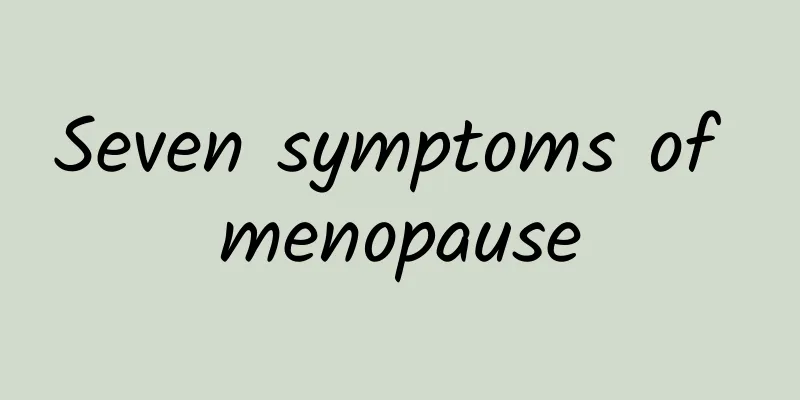Seven symptoms of menopause

|
Men also experience menopause like women. It is generally believed that after men reach the age of 50, the structure and function of male sex hormones will undergo an evolutionary process from prosperity to decline. During this period, the net weight of male testicles decreases, the volume shrinks, the seminiferous tubules begin to shrink, the spermatogenic epithelial cells become soft, and spermatogenesis is hindered. Because the spermatic artery in the male testicles is hardened and the oxygen supply is insufficient, the specificity of the enzyme system related to male hormones in the spermatic vein is reduced. In addition, during the whole process of the gradual decline of male testicular function, the pituitary gonadotropin slowly decreases, and its effect is parallel to that of female hormones. Because of the transgenic changes in the male testicular interstitial cells, the response to gonadotropin becomes weaker, which in turn weakens the androgen effect of the male testicular interstitial cells, and thus the attached and attached sex hormones that depend on androgens also begin to gradually decline. After men reach the age of 50, the structure and function of sex hormones will undergo a complete evolution from prosperity to decline. As age increases, androgen-binding protein increases, so the concentration of testosterone ore also decreases with age. This decrease is more significant and precedes the decrease of total testosterone. The 7 major symptoms of male menopause: Skin aging begins with facial wrinkles 7 common symptoms of male menopause 1. Skin brittleness. Skin aging begins with wrinkles on the face. Then the skin on the neck, hands and feet will also become loose and loose. This is caused by the gradual reduction of body fat and elastic tissue. 2. Cardiac neurosis. The main symptoms are palpitations, chest pain, fatigue, and nervousness. It is more common in women, young people, and adults aged between 20 and 40. They may have symptoms such as tachycardia, insomnia, and poor sleep. Heart X-ray examinations, electrocardiograms, and laboratory tests are mostly normal. Men's menopause is mainly characterized by palpitations, chest pain, fatigue, and nervousness. 3. Mania and depression. 4. Cardiovascular and cerebrovascular disease fragility. As people age, the heart often develops hypertrophic endocardial thickening, which may be caused by the increase of cardiac connective tissue, lipid deposition, and thickening of the heart valves and other structures. In addition, the vascular elasticity is poor, hardening, arteriosclerosis, blood vessel shrinkage and other vascular problems may also appear successively. The vascular regulation is disordered, and sometimes the whole body will be hot like a child, and even kick the mattress, feel restless, have a headache, dizziness, palpitations, etc. 5. Hypertension. It can occur in people of all ages, but is more common in people over 40 to 50 years old. Slowly progressive hypertension is often discovered during routine physical examinations in the early stages, with symptoms such as headache, dizziness, insomnia, memory loss, lack of concentration, fatigue, palpitations, etc. It can be diagnosed by checking blood pressure several times and taking chest X-rays and electrocardiograms intermittently. Erectile dysfunction in middle-aged and elderly people is often related to some organic diseases. 6. Impotence. Impotence can be seen in people of all ages after marriage, with the main symptoms being flaccidity and inability to erect or short erection time. Most of them are young or middle-aged patients. Impotence in middle-aged and elderly people is often related to some organic diseases. Male menopausal gastrointestinal dysfunction is a type of neurological disorder 7. Gastrointestinal dysfunction. Gastrointestinal dysfunction is a type of neurological disorder, which is mainly characterized by digestive tract diseases, which may be limited to the pharynx, esophagus or stomach, but gastrointestinal diseases are the most common. It may also be accompanied by other common symptoms of neurological disorders, such as fatigue, memory loss, inattention, nervousness, insomnia, poor sleep, headache, sweating, anxiety, frequent nocturnal emission, etc. |
<<: A man has a hard lump on his testicle
>>: Boys have lumps in their chests and it hurts
Recommend
Men's preparations before pregnancy
Giving birth to a healthy baby requires the joint...
What is the reason for the high red blood cell and white blood cell count in urine test?
Many friends, especially male friends, in their d...
Why do I get an erection in the morning?
Morning erection means that the male penis subcon...
Chen Weiting has nice chest muscles. Here are two ways to train your chest muscles
Chest muscles are a symbol of whether a man is st...
How to quickly improve male sexual ability?
Men have a natural competitive spirit, especially...
White discharge in the foreskin
The foreskin is often the most easily neglected p...
What happens if pimples appear on the male genitals?
For men, the genitals are very sensitive and impo...
Causes of red spots on foreskin
With the frequent urban and rural travels, male f...
Pig kidneys nourish the kidneys, three recipes for pork kidneys nourish the kidneys
Chinese food therapy emphasizes "like replen...
How to treat premature ejaculation due to kidney deficiency? Symptomatic treatment is the key
Traditional Chinese medicine believes that the ki...
Summer health: the most effective kidney-tonifying recipe
In the hot summer, people tend to be listless. Se...
How to improve bad skin on boys' faces
In an era where everyone is pursuing beauty, skin...
What is the reason why men urinate blood?
What is the reason for men to have blood in their...
Testicular pain after varicocele surgery, what is the cause?
Varicose veins are a urogenital disease that all ...
There are small granules on the testicular epidermis
Orchitis refers to the inflammation of the male t...









